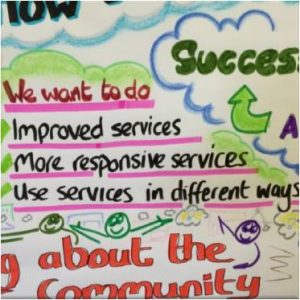
Using graphics and storyboarding makes participation fun and engaging
Between the 2nd and the 8th July 2015 North Tyneside CCG, in collaboration with MutualGain, held three sessions designed to enable the public to influence spending decisions on access to urgent care services. The process used was a new commissioning version of the tried and tested technique of Participatory Budgeting.
As part of the exercise, officers from the organization provide simplified breakdowns of the relative spend on providing current services, as well as forecasting spend on possible future services.
This allowed members of the public, alongside representatives from providers and the programme board for the Urgent Care redesign all to give their views on a variety of services and potential options for future commissioning in the area, focussed around real life ideas of budget and future expenditure.
The discussions reflected the challenge that North Tyneside CCG faced in providing Urgent Care in an environment of reducing budgets, and allowed participants to focus on what they believed were the most important parts of the system. The process itself requires an organization to fully engage with the democratic process, with the success of the exercise relying on a high level of transparency and local ownership.
- For more information read the full case study on the Mutual Gain website
Mutual Gain provide a full range of public engagement services and as part of their work frequently support and promote participatory budgeting initiatives. Read other case studies on their PB work:
- Wythenshawe Safe Spots Domestic Violence Project
- Brent Childrens services case study
- Cheshire East case study
- Greater Manchester Police case study
